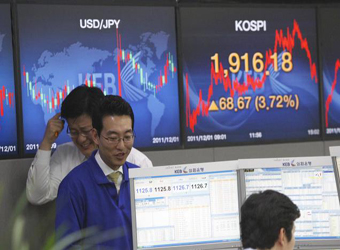Markets in Asia traded higher on Friday for the last trading day of the quarter, following a rally in U.S. stocks overnight.
But trading volume is set to be thin as many markets in the region, including Australia, Singapore, India, and Indonesia, are closed for the Good Friday public holiday.
Japan’s Nikkei 225 rose 295.22 points, or 1.4 percent, to 21,454.30 while the Topix added 12.30 points, or 0.72 percent, to 1,716.30. In South Korea, the Kospi rose 9.48 points, or 0.39 percent, to 2,445.85.
In the Greater China region, Taiwan’s Taiex gained 60.30 points, or 0.56 percent, to 10,906.22.
The Shanghai composite gained 8.48 points, or 0.27 percent, to 3,169.01 while the Shenzhen composite added 23.62 points, or 1.29 percent, to 1,853.72.
In the currency market, the Japanese yen traded at 106.19 to the dollar at 2:29 p.m. HK/SIN, strengthening from a previous low of 106.53.
Major export stocks in the country were mostly higher. Shares of Nissan were up 0.87 percent, Honda added 0.52 percent, Sony was up 0.7 percent and Mitsubishi Electric was 0.12 percent higher. Toyota shares, however, fell 0.25 percent.
A relatively weaker yen is usually a positive for exporters because it increases their overseas profits when converted to the local currency.
Japan also released economic data that suggested an improvement in business activity last month. Industrial output rose 4.1 percent in February from the previous month against a median forecast for a 5 percent increase and followed a revised 6.8 percent decline in January, Reuters reported.
The seasonally adjusted unemployment rate in the country rose to 2.5 percent in February, from 2.4 percent a month earlier, while the jobs-to-applicants ratio fell a touch, according to the news wire.
Elsewhere, the dollar index, which measures the greenback against a basket of currencies, traded at 89.960 at 2:38 p.m. HK/SIN, slipping from an earlier high of 90.118.
Fears of a trade war between the United States and China appeared to ease this week and some analysts said they’re confident the two countries will negotiate a deal.
Beijing said last week it may target 128 U.S. products with an import value of $3 billion in response to President Donald Trump’s broad steel and aluminum import duties.
The U.S. president had also announced tariff plans for up to $60 billion in Chinese imports, although China didn’t officially connect its threats of retaliation to that White House action.
“The initial market response to President Trump’s proposed tariffs on China was an overreaction,” Shane Oliver, head of investment strategy and chief economist at AMP Capital, wrote in a recent note.
“Our view remains that China and the U.S. will reach a negotiated solution both in terms of trade and investment restrictions such that the tariffs and restrictions will ultimately be very modest, if at all,” he said, adding that it may take time to be resolved. “So market nervousness around this issue will linger for a while.”

